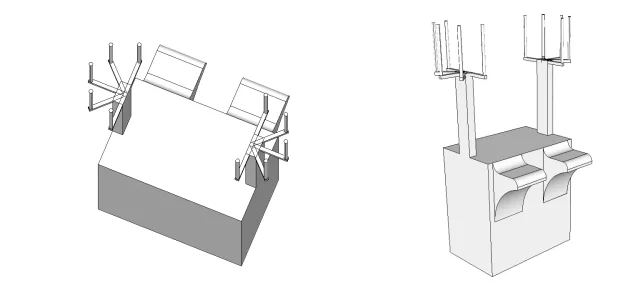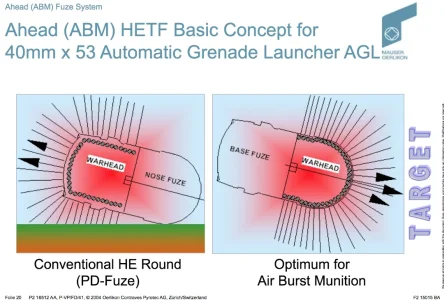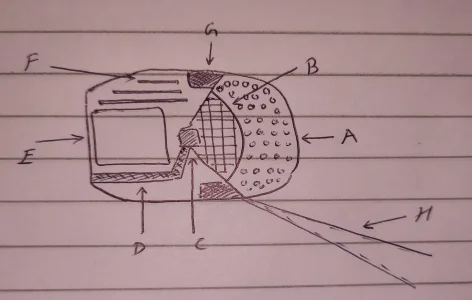- Joined
- Jun 30, 2024
- Messages
- 1,526
- Likes
- 5,238
No don't look at the bloody aug
No don't look at the bloody aug
An idea that our companies can adopt and refine and offer it to forces? @Ayan Barat @Blood+
View: https://www.youtube.com/shorts/D4DU3Woe7ew
Okay...being the resident "infantry-gun based anti-UAV system" opponent of DFB, let me put forth my defence.
Let's draw a parallel between trying to shoot down an UAV with an ADS trying to shoot down a plane...this is what most people miss, that despite being small and slow an UAV is still an "A" and you'll need proper "ADS" to counter it.
In any proper ADS you'd have atleast two sensors (one acquisition, one tracking radar), one effector (either gun or missile) and guiding algorithm (either guns calculating lead to predict the impact point or missiles guiding themselves).
This would be bit too harsh for the comparison so let's look at a bare bone example; a two man MANPADS team with one member being guided by the HQ radar to look at certain sector of the sky for a target (something like Wolf2, this is Command, inbound target, sector 90, altitude 3,000 feet, range 10 kilometers, heading west, prepare for engagement) and if not this then the spotter would be standing still and scan the whole horizon with his binoculars for potential target.
Upon detection they'd have atleast 5km to react; (range of MANPADS is higher, a helicopter is bigger so it's silhouette would appear earlier, noise would be more)
Now for a 5 man squad moving through a city with one soldier equipped with anti-UAV gun. (Either a shotgun or rifle with speciality ammunition)
• A UAV with pretty similar speed (250km/h in dive) to an AH-64E (300km max)
• but extremely small silhouette (less than 0.1x) and thermal - acoustic signature
• instead of a long ranged tracking radar, you now have just Ears 1.0
• instead of a Ku-Band tracking radar, you now have just Eyeball 1.0
• instead of sophisticated impact prediction algorithm you now have Brain 1.0. (how difficult it's to calculate "lead, we've just one Olympics medal in Trap Shooting...I know it's a flawed argument, but for a rough idea)
• a soldier can't stay and scan the sky for long while his squad is moving somthing a MANPADS team can do
• the max battle range of even 7.62x51mm is 600m, for a shot-shells it'd be hardly 100m. (At 300m away, you'd get just 5.5sec to down an UAV diving at 200kmph)
• shot-shells are notorious for their "spread". You use smaller pellets to decrease the gap between pellets and now you're 1mm diameter pellet isn't doing much damage to the FPV. You switch to 4mm pellets to counter this and now the gap between the pellets increases to much. It's a paradox.
The most sophisticated system we currently have to use small arms for anti-UAV role with any degree of success are the smart sights like SMASH2000 and Arbel. But even with them, the weakest link in the whole system turns out to be the human using it; how far away can you detect the drone? How fast can you react?
Here's a great video of Ukrainians experimenting with shotguns. Point to note is that the drone is coming head-on in a straight line and they know from where the drone would come.
View: https://x.com/GrandpaRoy2/status/1867288982763319720?s=19
The constraint of answering this is answering in a way that it justifies being discussed on a thread titled "...Small Arms and Weapons", so here's my shot at what I think is the most viable option we currently have for infantry UAV defenceAyan I agree with you. But how feasible would it be for every Buddy pair to lug around a BFS kind of set up for detection of UAV? Now since Russo- Ukraine already spectrum analyzer are being distributed. I think a solution which provides Pellets Curtain ( the kind of fish Net solution something shown on loop on discovery eons ago) fired from Auto shotguns/pellet firing AKs which themselves are mated to SMASH2000 which get alerted or and given general direction to fire by an advanced spectrum analyzer kind of drone detector and general drone direction indicator? Again this is my non expert advice. I know there shall be many loopholes here. But my idea was to give reliable portable cheap anti drone system for soldiers to carry.

Awesome love the ubgl idea. Doesnt bring any complications in rifle. @Suryavanshi can we add above post to Ideas thread! Ayan and blood+ are a gem for DFB. Makes me remember lengthy tech debates on arjun in yesteryears in dfi, militaryphotos and keypub.The constraint of answering this is answering in a way that it justifies being discussed on a thread titled "...Small Arms and Weapons", so here's my shot at what I think is the most viable option we currently have for infantry UAV defence
• The most accurate way of detecting a drone is obviously radars and it is in no way difficult to make a radar small enough to be mounted on someone's shoulder. Remember the seekers on radar guided missile can get as tiny as 8kg. Also, the power requirement is so low that you can use a Li-ion battery pack.
But the problem is that most of time it'd be carried by men WHO.LOVE.THEIR.TESTICLES so nope.
• The second-best option is the one you mentioned, real time spectrum analyzer. We can easily make a backpack, interferometer type set-up using 10 antennas that can give you a basic idea of direction based on which individual antenna receives the highest transmission. Here's a rough CAD I doodled
View attachment 18675
• Now coming to effector.
We've already discussed the shortcomings of using a shotgun or shot-shell firing assault rifle in detail. Here's one very important that I missed; as soon as you're handing someone a shotgun, you're removing an assault rifle from the team. Even if it's about assault rifle chambered in shot-shells, he'll need to change mags "to get his assault rifle back".
So instead of shot-shells, we can equip all five rifles of the squad with an UBGL and a rudimentary (to lower cost) SMASH2000 type sight. The biggest advantage is that both anti-UAV and assault rifle can be used simultaneously and everyone would have one.
• Its range is easily 500m, so you get more time to react
• A typical Medium Velocity 40x51mm grenade has a mass of 220g, so you have plenty of space to add a tiny proximity fuze (already done by multiple firms) and this'll cause the Single Shot Kill Probability to go through the roof.
• Also, a HE grenade has some 1,000 pre-formed fragments with a blast radius of 7-8m. So again, even if you miss by 5m, it will deliver sufficient fragments. And say somehow all the fragments miss then also the blast wave may cause the drone to tumble.
If anyone wants to patent it then go on, I'm giving it away royalty free
Ummmm...it's bit of an iffy topic.@Ayan Barat on second thoughts, ubgl idea shall work only if soldiers are firing from trench or some cover. Out in open it will cause frag even to shooter himself if employed at close ranges?


Thanks ..Yes indeed directional fragmentation would reduce risk. Did not know it's existence. And iirc regarding ERA and marching columns along side. Very frankly I don't remember most armies practicing such moves lately even iA. Troops are carried in armored vehicle or atleast trucks in columns behind tank if iircUmmmm...it's bit of an iffy topic.
Like you add an Active Protection System on a tank and can now neutralize all the incoming RPGs and ATGMs...noice, your multi-million dollar tank is safe now. But what about the infantry that was walking with the tank coloum when both the warhead of an APS round and that of an ATGM exploded few feets away from them? So this thing will always be there
But if casualties from fragmentation grenade is concerned then we already have what's called a "forward fragmentation" or "directional fragmentation" grenade in service. This thing will greatly reduce the chances of friendly infantry on ground eating shrapnel
View attachment 18695
EDIT : Here's the rough idea
View attachment 18698
A: Steel or tungsten balls in front
B: Typical RDX type charge
C: Electric detonator
D: Self Destruct Tracer; it'll ignite upon firing and if the grenade doesn't detect any target then I'd reach the detonator in say 6-7 second. So you don't have the risk of a grenade falling
E: Setback Generator: Nothing fancy, just a strong rare earth magnet sitting inside a coil. The inertia of firing it would cause the magnet to move, inducing current in the coil. This current would be captured by a super capacitor to power everything
F: All the electronic circuitry, including the Safe Arm and Destination parts
G: IR laser proximity sensor, these would be situated in the periphery in an annual manners...even one would do as the grenade is rotating due to rifling but it's good to have three or four for redundancy
H: The typical scanning cone by one proximity sensor
Machining quality is really good. Hope they will be able to shave some more bulkView attachment 19936Asmii looks good
Yea the 550 units they delivered are in some really good condition with great finishMachining quality is really good. Hope they will be able to shave some more bulk
sweet but could use some better stippling on the handgripView attachment 19936Asmii looks good


